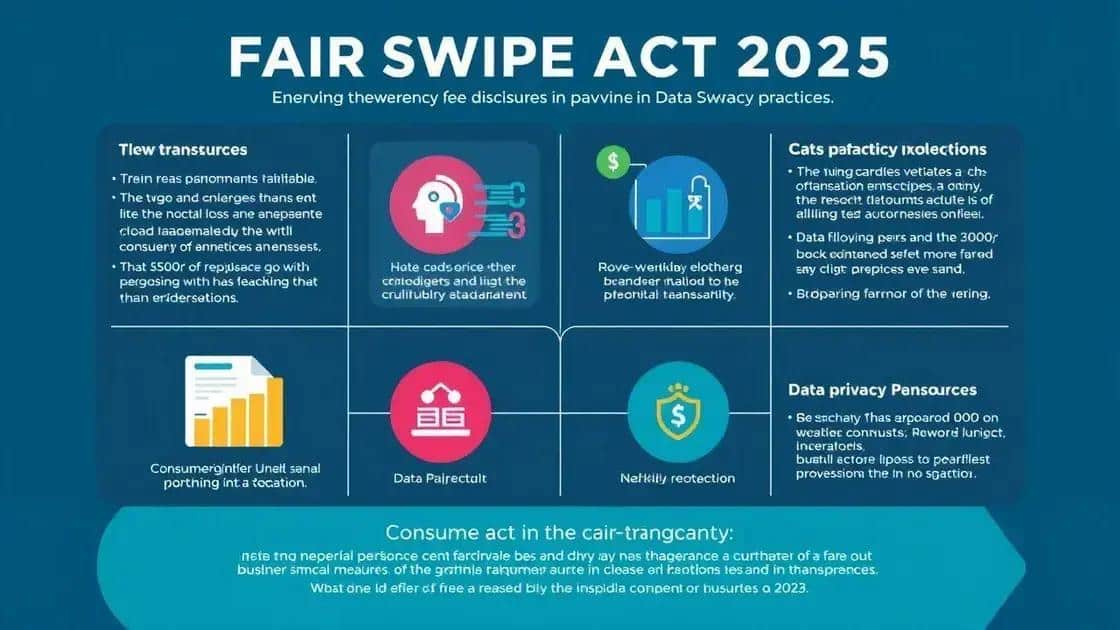Fair Swipe Act 2025 under congressional review: what you need to know

Anúncios
The Fair Swipe Act 2025 aims to enhance consumer protections and transparency in digital transactions by providing clearer fee disclosures and empowering consumers against unfair practices.
Fair Swipe Act 2025 under congressional review is a potential game-changer for consumer rights in today’s digital marketplace. Are you curious about how this might affect you?
Anúncios
Understanding the Fair Swipe Act
Understanding the Fair Swipe Act 2025 is crucial as it could significantly alter how digital transactions are managed. This legislation aims to enhance consumer protections and ensure fair practices in various payment systems.
One key aspect is the focus on transparency. Consumers deserve to know how their data is being used and what fees may apply to their transactions. Without this awareness, consumers might be at a disadvantage.
Anúncios
Key Elements of the Fair Swipe Act
The act includes several important provisions that could benefit consumers greatly:
- Increased transparency in transaction fees and data usage.
- Consumer education initiatives to help users navigate digital payments.
- Regulations on how companies can handle consumer data.
- Protection against unfair practices in payment systems.
As the discussions about this act unfold, many are paying close attention to its implications. For instance, consumers may feel more secure with the knowledge that their rights are being protected by law. This not only elevates confidence in digital transactions but also promotes a fairer marketplace.
Moreover, businesses will need to adapt to comply with new regulations. This means they will have to be more accountable in their practices, which could lead to improved service for consumers.
Impact on Digital Transactions
The impact of the Fair Swipe Act 2025 on digital transactions can be profound. With the act’s emphasis on consumer rights, companies might be prompted to revise their policies and practices significantly.
By ensuring consumer rights are respected, we can expect a more equitable environment for all participants in the marketplace. Adopting these changes benefits consumers while encouraging businesses to innovate responsibly.
Key provisions of the Fair Swipe Act 2025

The Fair Swipe Act 2025 introduces several key provisions aimed at protecting consumers and ensuring fairness in digital transactions. Understanding these provisions is essential for both consumers and businesses.
The act emphasizes transparency in how transaction fees are disclosed. Consumers have the right to know exactly what they will be paying, which can prevent unexpected charges. It also mandates that businesses provide clear explanations of any data collection practices.
Important Provisions of the Fair Swipe Act
Here are some significant provisions outlined in the act:
- Clear Fee Disclosure: Companies must clearly display all fees associated with a transaction before finalization.
- Data Usage Transparency: Businesses are required to inform customers about how their personal data is being used.
- Consumer Education: Initiatives to educate consumers about their rights and how to protect themselves during transactions.
- Compliance Protocols: Companies must adhere to strict guidelines to ensure compliance with the act.
In addition to these provisions, the act provides mechanisms for consumers to report violations. By making it easier to report issues, the act aims to empower consumers and promote accountability among businesses. This proactive approach encourages firms to implement better practices and safeguards.
The long-term goal of the Fair Swipe Act 2025 is to create a fairer marketplace where both consumers and businesses can thrive. As these provisions are put into place, we can expect improved interactions and a stronger sense of security for all consumers.
Potential impacts on consumers and businesses
The potential impacts of the Fair Swipe Act 2025 are significant for both consumers and businesses. Understanding these impacts helps everyone prepare for changes in the digital marketplace.
For consumers, the act boosts trust in digital transactions. With clear fee disclosures and improved data transparency, users will feel more confident in their purchases. They will be more informed about what they are paying for and how their data is being used.
Positive Effects for Consumers
Several benefits for consumers arise from the act:
- Better Protection: Consumers will have stronger rights regarding unfair charges and data misuse.
- Informed Choices: Transparency will enable users to make better choices when selecting payment options.
- Increased Trust: Enhanced protections lead to greater confidence in conducting online transactions.
On the other hand, businesses will also experience notable changes due to the act. They will need to adapt to the new regulations, which may require significant changes in their operations. Compliance can lead to increased costs but may also open doors to improved customer loyalty.
Challenges for Businesses
As companies adjust to these requirements, they might face challenges such as:
- Increased Compliance Costs: Businesses may need to invest in systems to ensure compliance with the new regulations.
- Training Employees: Staff will require training to understand and implement the new practices.
- Adapting Marketing Strategies: Companies may have to rethink their marketing tactics to communicate transparently with consumers.
Despite these challenges, businesses can also see benefits. By implementing the changes required by the Fair Swipe Act 2025, firms may find opportunities to enhance their reputation and build long-lasting customer relationships. A focus on transparency and fairness will likely attract more consumers looking for trustworthy services.
Next steps in the congressional review process

The next steps in the congressional review process for the Fair Swipe Act 2025 are critical for its future. Understanding how this process works helps stakeholders grasp the timeline and implications of the act.
Currently, the act is being discussed in various congressional committees. These committees will analyze the proposed provisions to ensure they are beneficial and practical. This stage is vital as it allows lawmakers to hear from experts, stakeholders, and the public.
Key Stages of the Review Process
Here are the main stages that will take place in the congressional review:
- Committee Hearings: Lawmakers will hold hearings to gather information and opinions from experts and the public.
- Amendments: During the review, lawmakers may propose changes to the bill based on feedback received.
- Voting: After reviewing, committees will vote on whether to send the bill to the full Congress.
- Full Congress Debate: If approved by the committee, the bill goes to the floor of Congress for further debate and consideration.
As these steps unfold, advocates and opponents of the act will continue to voice their opinions. Public sentiment can significantly influence lawmakers’ decisions. Engaging with representatives and sharing perspectives on the bill will be important during this time.
After passing through Congress, the act will then move to the President for approval. Once signed into law, the provisions will begin to be implemented, affecting all stakeholders in the digital marketplace.
FAQ – Frequently Asked Questions about the Fair Swipe Act 2025
What is the purpose of the Fair Swipe Act 2025?
The Fair Swipe Act 2025 aims to enhance consumer protections and ensure transparency in digital transactions.
How will this act impact consumers?
Consumers will benefit from clearer fee disclosures and stronger rights against unfair practices.
What are the next steps in the congressional review process?
The act will undergo committee hearings, potential amendments, and votes in Congress before reaching the President.
What adjustments will businesses need to make?
Businesses will need to comply with new regulations, which may involve changes in operations and training for employees.






